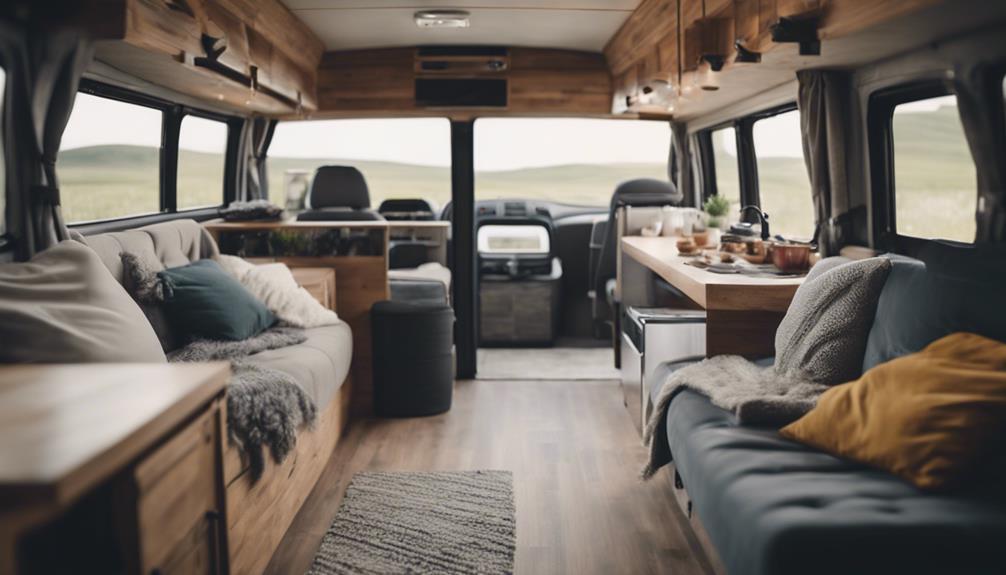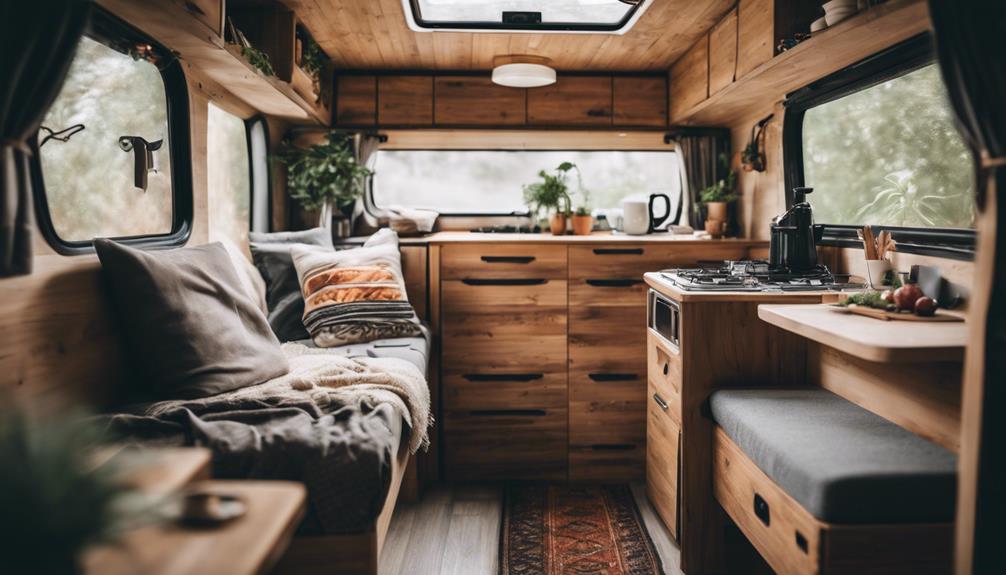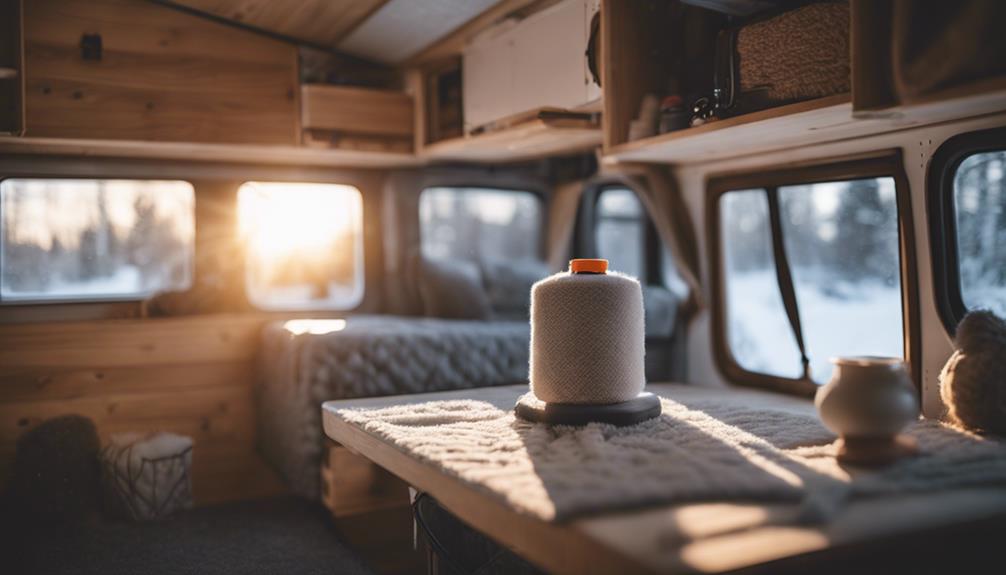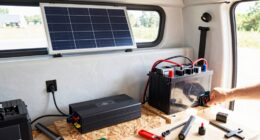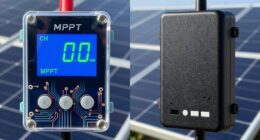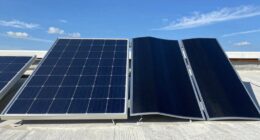When picking a small van for camper conversion, consider the Ford Transit Connect for its fuel efficiency and city-friendly size, averaging 25 mpg. The Ram ProMaster City offers ample cargo space with a boxy design, perfect for comfortable setups. Meanwhile, the Chevy Astro brings all-wheel drive and 170 cubic feet, ideal for adventurous trips. If you need more room, the Mercedes Metris stands out with 199 cubic feet of space, balancing maneuverability with comfort. Each option has unique advantages that suit different lifestyles—stick around to explore which van fits your van life dream best!
Introduction
If you're considering a camper conversion, choosing the right small van can make all the difference in your adventure. The right small camper van not only affects your comfort but also influences the entire conversion process. For van lifers, finding a vehicle that offers a functional space and ample cargo volume is essential. The best choice often balances affordability and efficiency, ensuring you have enough interior space for your needs.
For instance, the Chevy Astro and GMC Safari are popular choices due to their boxy shape and 170 cubic feet of cargo volume, perfect for larger setups.
If you're looking for something compact, the Ford Transit Connect provides a fuel-efficient option with an average of 25 MPG, making city driving easier.
The Ram Promaster City also stands out with its near-vertical sidewalls and 132 cubic feet of cargo volume, simplifying the conversion process.
For budget-conscious van lifers, the Nissan NV200 offers an affordable option with 122 cubic feet for storage.
Finally, the Mercedes Metris provides 199 cubic feet of cargo volume, making it ideal for those seeking more interior space.
Each option has unique benefits tailored to fit your adventure needs.
Background Information
Van life has transformed from a niche lifestyle into a popular trend, appealing to those seeking adventure and freedom.
As more people embrace this way of living, the demand for camper conversions has surged, leading to a variety of small vans that are perfect for the job.
You'll want to know the best options available to help you hit the road comfortably and efficiently.
Van Life Origins and Evolution
The van life movement started gaining momentum in the late 20th century as a counter-culture response to conventional living, inviting adventurers to embrace a more nomadic lifestyle. Early adopters often utilized the iconic Volkswagen Type 2, perfect for road trips and camping adventures. This vehicle became synonymous with freedom and exploration, laying the groundwork for the popularity of camper conversions in small vans.
As we moved into the early 2000s, social media platforms, particularly Instagram, played a vital role in amplifying van life. People began sharing their minimalistic lifestyles and eco-friendly practices, inspiring others to join the movement. The focus on sustainability and mobility resonated with many, as it offered a practical solution for budget-conscious travelers seeking an adventure.
Today, van life emphasizes a connection to nature, allowing you to travel while living minimally. With growing environmental concerns, the community increasingly favors small vans that promote sustainable living. This evolution reflects a broader desire for freedom, adventure, and a lifestyle that prioritizes experiences over material possessions.
Van Conversion Popularity Surge
Increasingly, people are embracing the van conversion trend as a way to simplify their lives and commence on new adventures. This movement has gained momentum, particularly among those interested in the van life lifestyle and minimalistic living. Small camper vans, like the Ford Transit Connect and Ram ProMaster City, are popular choices due to their affordability and fuel efficiency.
Many first-time van lifers explore the robust used van market, where models like the Volkswagen Transporter and Mercedes Metris offer great customizable options. The average conversion costs range from €5,000 to €15,000, making it accessible for many looking to create their own unique space on wheels.
Online communities have blossomed, providing essential support and resources for individuals diving into van conversions. These platforms are invaluable for sharing tips on design, maintenance issues, and overcoming challenges that arise during the conversion process.
Whether you're renting a van to test the waters or diving into a full conversion, the surge in popularity of van life reflects a desire for freedom, adventure, and a simpler way of living.
Recent Van Conversion Innovations

When you're planning your camper van conversion, consider incorporating sustainable materials that not only reduce your environmental impact but also enhance the overall design.
Eco-friendly options, like bamboo or recycled composites, are gaining popularity for their durability and aesthetic appeal.
Sustainable Materials in Conversions
Recent innovations in van conversions highlight a variety of sustainable materials that not only reduce environmental impact but also elevate the overall aesthetic and durability of your camper.
You'll find that incorporating eco-friendly insulation options, like sheep's wool or recycled denim, provides excellent thermal regulation while minimizing your reliance on synthetic alternatives.
Using materials such as bamboo and recycled plastics, you can create a stylish yet sustainable interior. Many converters are also opting for solar panels made from sustainable materials, enabling off-grid energy solutions that reduce fossil fuel dependency during your travels. This approach not only helps the environment but also keeps your camper energy-efficient.
Moreover, the use of biodegradable finishes and non-toxic sealants in cabinetry and flooring promotes healthier indoor air quality, greatly reducing harmful emissions.
Lightweight materials, including hemp composites and reclaimed wood, guarantee your camper maintains structural integrity while enhancing sustainability.
By choosing these sustainable materials for your conversion, you can create a comfortable, eco-friendly space that reflects your values and love for adventure.
Embrace innovation, and let your camper be a symbol of sustainable living on the road.
Eco-Friendly Conversion Materials
Many van converters are now embracing eco-friendly materials that not only enhance sustainability but also improve the overall functionality and aesthetics of their mobile living spaces.
One popular choice is sustainable bamboo for cabinetry, which is lightweight and durable, helping to reduce the van's overall weight while providing a stylish finish.
Recycled plastics and composites are increasingly used for flooring and insulation, offering excellent thermal properties that keep your camper cozy without harming the environment.
To support off-grid living, solar panels made from recycled materials let you harness renewable energy, reducing reliance on fossil fuels.
When it comes to finishes, low-VOC paints are favored to enhance indoor air quality, ensuring a healthier living environment.
Biodegradable insulation materials, such as sheep's wool or cotton, are also gaining traction for their natural thermal performance and minimal ecological footprint.
Cost-Benefit Evaluation
When you're considering a small van for conversion, it's essential to weigh the costs against the functionality you'll gain.
You'll want to analyze how much you're spending versus the features you truly need, and industry experts can provide valuable insights into this balance.
Cost Versus Functionality Analysis
Evaluating the cost versus functionality of small vans for camper conversion reveals that the right balance can greatly enhance your travel experience without breaking the bank.
When considering small camper van conversions, it's essential to weigh upfront purchase costs against long-term maintenance costs. For instance, while the Ram ProMaster offers a budget-friendly choice with lower initial prices, its resale value may not be as strong as other models.
Fuel efficiency plays a significant role in your overall expenses. The Ford Transit Connect, with an average of 25 mpg, provides a cost-effective option for long trips, making it a favorite among travelers.
Additionally, cargo space and customization options can influence conversion costs, with basic conversions starting around €6,236 and advanced builds exceeding €31,126.
Ultimately, finding the right small van means evaluating how its functionality aligns with your budget. A higher initial investment in models like the Sprinter might be worthwhile, given its better resale value over time.
Balancing these factors guarantees you get the most out of your camper conversion, so you can hit the road with confidence.
Industry Expert Insights
Industry experts emphasize the importance of weighing the initial investment against potential long-term benefits when selecting a small van for camper conversion. Popular models like the Ford Transit and Ram ProMaster offer appealing features for your small campervan project. The average conversion costs range from €5,000 to €17,500, with many opting for basic conversions around €8,500, which influences your overall budget.
When considering these models, fuel efficiency is a key factor, as both the Ford Transit and Ram ProMaster average around 24-25 mpg, making them cost-effective choices for long-term travel. You'll also want to factor in maintenance costs, which can range from $2,000 to $4,000 over five years—significantly lower than larger models.
However, keep in mind that small vans tend to depreciate faster, impacting resale value. This makes it vital to evaluate whether you're in it for the long haul or if a quick flip is part of your plan. Ultimately, understanding these cost dynamics will help you make a more informed decision about your camper conversion investment.
Cost Vs. Features Breakdown
Understanding the balance between cost and features is essential for maximizing the value of your small van conversion investment. When considering a camper conversion, you'll find that the average conversion costs range from €5,000 to €15,000, with total expenses potentially hitting €17,500. It's vital to evaluate the cost vs. features of the small van you choose.
Popular models like the Ford Transit Connect and Ram Promaster City offer a good mix of features and affordability, priced around $25,000 and $24,000. For budget-friendly options, don't overlook used models like the Chevy Astro, which can start at about $12,000.
Keep in mind that features like insulation, electrical systems, and multifunctional furniture can greatly impact your overall budget. In fact, around 40% of your conversion expenses might go towards electrical setups alone. A basic conversion can begin at approximately €6,236, but if you're after advanced features, costs can soar to €31,126.
Essential Tools for Conversion

When you're ready to start your camper van conversion, having the right tools makes all the difference.
Essential tools like a power drill, jigsaw, and measuring tape will help you tackle the conversion process efficiently.
Let's explore some recommended tools that will set you up for success in creating your dream van.
Conversion Process Overview
To successfully convert a small van into a camper, you'll need essential tools like a power drill, jigsaw, and measuring tape for precision and efficiency. The conversion process requires accurate measurements of the van's interior space, ensuring that all components fit seamlessly. A measuring tape is your best friend here, helping you avoid costly mistakes.
You'll also need insulation tools, such as a utility knife and adhesive spray, to properly insulate various surfaces. Good insulation is key for maintaining a comfortable temperature inside your camper. For assembly and securing electrical components, a socket and wrench set will be invaluable. These tools help you install fixtures and make adjustments as needed throughout the build.
Don't forget about safety gear! Gloves, goggles, and a dust mask are essential for protecting yourself from debris and hazardous materials during the conversion process.
With the right essential tools and safety measures in place, you'll be well-equipped to tackle your camper conversion project and transform your small van into a cozy retreat on wheels.
Conversion Tool Recommendations
Equipping yourself with the right tools is fundamental for a successful camper van conversion, making the process smoother and more enjoyable.
Start with a thorough toolset that includes a circular saw for cutting materials and a jigsaw for those intricate cuts in wood and insulation. A drill is another must-have for assembling furniture and fixtures, while a multi-tool can handle various tasks like sanding and trimming.
Don't forget about the importance of a measuring tape; it'll help you optimize space and guarantee everything fits perfectly. A level is important for keeping surfaces even, which is key in any professional conversion.
Safety gear, including gloves, goggles, and a dust mask, is critical to protect yourself from potential hazards during the conversion process.
For added versatility, consider having a heat gun on hand for bending materials and applying adhesive.
With these necessary tools at your disposal, you'll be well-prepared to tackle your camper van conversion and create a space that fits your needs perfectly.
What Makes These Top Picks Suitable for Camper Conversion?
Looking for the best small van camper conversion options? These top picks are suitable for camper conversion because of their compact size, customization potential, and efficient use of space. With features designed for road trips and camping adventures, these vans offer a practical and convenient way to travel and explore.
What Makes the Top Picks for Small Vans the Best for Camper Conversion?
When it comes to camper conversion, the best small van conversion options are top picks for a reason. These vans offer the ideal mix of size, maneuverability, and interior space for creating a cozy and functional living space on the road. With the best small van conversion, you can create the camper of your dreams.
Conclusion
To summarize, choosing the right small van for camper conversion hinges on your specific needs, whether you prioritize fuel efficiency, cargo space, or versatility for adventures.
The Ford Transit Connect is perfect if you want excellent fuel efficiency, averaging 25 mpg, making it ideal for city driving.
On the other hand, the Ram Promaster City impresses with its boxy design and a cargo volume of 132 cubic feet, offering ample room for a comfortable camper setup.
If you're looking for versatility, consider the Chevy Astro, which provides all-wheel drive and a generous cargo volume of 170 cubic feet, ideal for outdoor adventures.
For those needing even more space, the Mercedes Metris stands out with a cargo volume of 199 cubic feet, balancing maneuverability and roominess for your camper conversion.
It's also worth noting that the market for used vans remains strong, with models holding their value well.
This makes investing in a used small van like these options a smart choice for your camper conversion journey.
Ultimately, assess your priorities and choose a van that aligns with your camping lifestyle and requirements.
Frequently Asked Questions
What Vans Are Best for Camper Conversion?
When you're considering vans for camper conversion, look for options like the Ford Transit Connect or Ram Promaster City. Their size, cargo space, and fuel efficiency make them great choices for your adventures.
What Size Van Is Best for Camper Conversion?
For camper conversion, aim for a van between 15 to 20 feet long. This size balances space for amenities and maneuverability, while a high roof guarantees you can stand comfortably and move around effortlessly.
What Is the Best Vehicle for a Camper Van Conversion?
When considering the best vehicle for a camper van conversion, think about your needs for space, fuel efficiency, and maneuverability. Options like the Ford Transit Connect and Nissan NV200 are excellent choices for various lifestyles.
What Is the Best Small Surf Van?
When you're searching for the best small surf van, consider the Volkswagen Transporter for its space, or the Ford Transit Connect for fuel efficiency. Each option offers unique features that cater to your surfing adventures.
Conclusion
In summary, choosing the right small van for your camper conversion is vital for a successful adventure.
With so many options available, consider factors like space, budget, and recent innovations to find the perfect fit for your needs.
Remember to weigh the cost benefits and gather the essential tools before diving into the conversion process.
By doing so, you'll create a cozy, functional space that enhances your travel experiences and makes your adventures unforgettable.
Happy converting!




